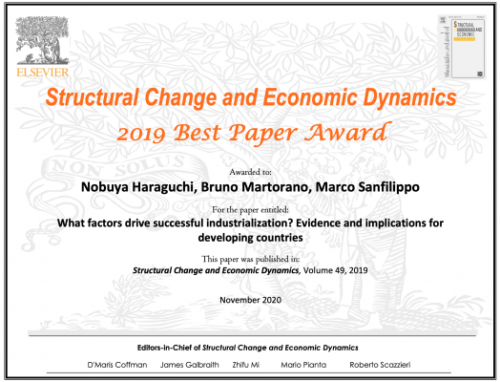Award-winning UNIDO paper focuses on factors driving successful industrialization
08.12.2020

VIENNA, 25 November 2020 – Today, during its 30th anniversary event, the renowned academic journal ‘Structural Change and Economic Dynamics’ announced that the UNIDO paper “What factors drive successful industrialization? Evidence and implications for developing countries” earned its prestigious 2019 Best Paper Award.
The Journal’s Editorial Board selected the paper based on several criteria, including its significance for dynamics, structural change, economic, technological institutional behavior, methods and innovation. “The paper best represents the structural dynamics strands”, said Elsevier’s Publishing Director. “It explores the relationships between industrialization, structural change dynamics and development trajectories”.
The UNIDO paper addresses the question of what countries, especially laggard countries, can do to initiate a sustained process of rapid industrialization, which is one of the critical development issues. It identifies factors that are common to countries that experienced strong and sustained industrialization over the last decades and finds that industrialization is driven by combination of factors, including initial economic conditions, factor endowments as well as country characteristics such as demography and geography.
“Countries, which are able to take advantage of their comparative advantages, are likely to be in the position to embark on a path of sustained industrialization”, said UNIDO Deputy to the Director General Hiroshi Kuniyoshi. “Due to their latecomers’ advantages, lower income countries have more opportunities to succeed in rapid growth of their manufacturing sectors”.
However, the latecomers’ advantages need to be harnessed and realized by several policy measures including investment in physical and human capital, access to credit, reduction of inequality, and macroeconomic, political and social stability. The details on how a mix of these factors drove the industrialization of certain countries in specific time periods are elaborated with policy implications in the paper written by UNIDO Chief, Research and Industrial Policy Advice Division, Nobuya Haraguchi.
The paper is based on UNIDO’s research and it represents the Organization’s research excellence by combining academic knowledge with development practice: it represents the strengths, contributions and usefulness of the Organization’s research and policy advisory work on Inclusive and Sustainable Industrial Development.
The Government of Japan through the Development Cooperation Trust Fund supported the research project, which led to the publication of the award-winning UNIDO paper.

Related Links
- Event Report: Sustainable Technology Exhibition 2021
- Women's Empowerment and SDG Goal 9 "Industry, Innovation, and Infrastructure" (20 May) *O…
- UNIDO and Japan to support Egypt with alternative approach to single-use plastics product…
- Launch of the Global Alliance on Circular Economy and Resource Efficiency *Recorded Video…
- Industries post-COVID-19: A gender-responsive approach to global economic recovery

